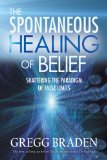Gregg Braden is my kind of philosopher. With a strong background in physics and engineering, he brings a rigorous, common-sense approach to the metaphysical world. This means he writes about ‘hippy stuff’ by first analysing the evidence and then presenting conclusions.
His conclusions are much the same as all the others writing about ‘hippy stuff’. But, if you’re even vaguely sceptical, then Gregg will help you weigh up the data and draw your own conclusions, rather than telling you what to believe.
So would we recommend this book?

 “The Spontaneous Healing Of Belief“, I have to say, is a title that wouldn’t have made any sense to me, if it weren’t for my background in science, psychology and so-called “New Age Spirituality”. But for anyone looking at this book in a store, the opening sentence on the back cover helps clear things up:
“The Spontaneous Healing Of Belief“, I have to say, is a title that wouldn’t have made any sense to me, if it weren’t for my background in science, psychology and so-called “New Age Spirituality”. But for anyone looking at this book in a store, the opening sentence on the back cover helps clear things up:
“Could a change in our perceptions – a shift in our beliefs – hold the timeless secret to healing, peace and even reality itself?”
Or maybe it doesn’t?!!!
This is a book about how the biology of our brain creates beliefs and how these beliefs then act as filters in the way we perceive the world.
So, for example, if someone holds a belief that the world is a dangerous and angry place, then they will be more likely to spot evidence in their life that confirms this belief. If, on the other hand, they believe that the world is generally friendly and a positive place to be, they will filter their experience to notice the good stuff more often.
Gregg’s book goes much deeper than that, into how the really subtle areas of quantum physics (explained in words a 12 year-old would understand) impact our brain – and beliefs – and how all of this literally creates the “reality” in which we live.
He gives the reader tools to help you get your conscious mind back under control, to have more choice in the thoughts you are thinking, the emotions you are feeling and the actions you are taking. He explains, step by step, how to pinpoint specific beliefs that have been holding you back and – to a certain extent – how to change them.
From the point of view of being able to apply the stuff from the book, Gregg could go a little deeper into the “how”. But I suspect his main aim with this book is to wake us up to the fact that our beliefs exist and have a massive impact on our life, rather than being a substitute for therapeutic intervention.
“The Spontaneous Healing Of Belief” is structured logically and is a book you’ll want to read from beginning to end, rather than dipping in and out. Gregg makes it easy to grasp the main concepts by using his “Belief Code” lists, whilst also illustrating the theoretical points with real-life case studies.
Despite the book being well-researched and well-written, some of the concepts and metaphors Gregg presents may be hard for a typical reader to swallow. But at least they’re presented with more evidence and scientific rigour than most other books on similar topics. And, whether you believe his arguments or not, he does make a compelling case that our beliefs can seriously hold us back from living the life we truly want – and that we can change our beliefs.
Is It A Book For You?
- If you’re someone who is ready to jump in and discover just how much of your life you are currently creating by accident, but like a scientifically justified approach, then this is the book for you. Gregg Braden demysitifies much of the mythology that other “New Age Thinking” books have spun around the topic of “manifesting”.
- If, however, you’re scared by the very memory of school biology and physics classes, then this is probably not your cup of tea. Although the science is explained clearly, the book does require you to be interested in the research and to be at least vaguely open to taking action!
Personally, I found this book inspiring, particularly given its thoroughness in combining the latest scientific research with ancient wisdom. Even if just one of the ideas in the book resonates for you, it could change the way you think about life. The question is, are you ready yet?
If you have read this book, I’d love to hear what you thought of it – good or bad! Please share your views via the comments box, below. Thanks!
